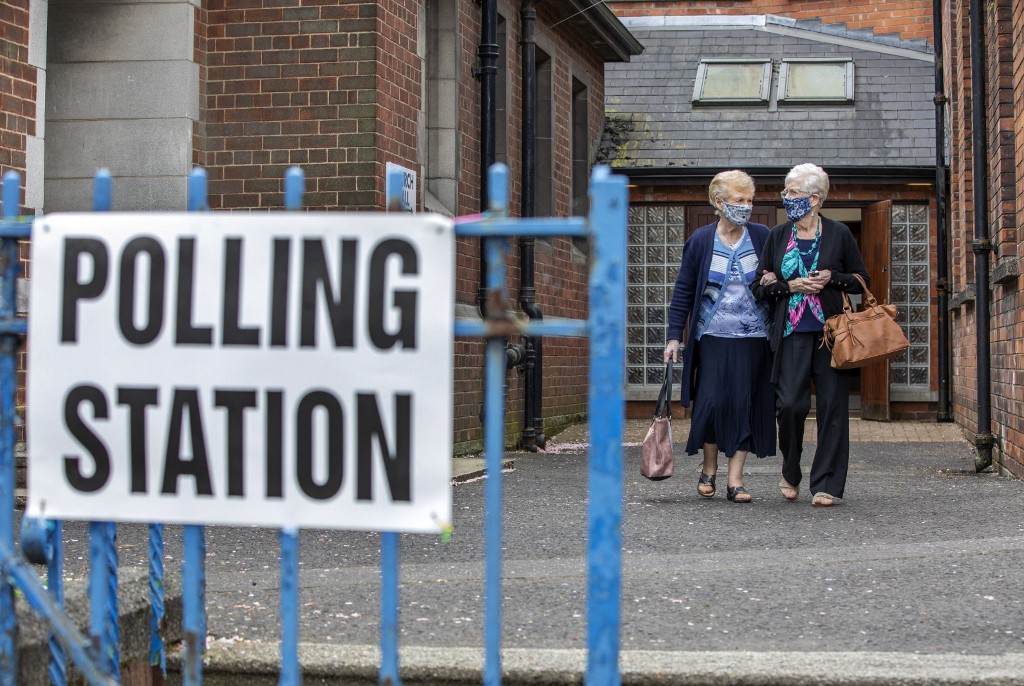LONDON: Britain’s governing Conservatives suffered local election losses in their few London strongholds, according to results announced Friday that will pile more pressure on Prime Minister Boris Johnson amid ethics scandals and a worsening economic picture.
Voting held Thursday for thousands of seats on more than 200 local councils decided who will oversee garbage collection and the filling of potholes, but were also an important barometer of public opinion ahead of the next national election, which must be held by 2024.
The main opposition Labour Party, which has been out of power nationally since 2010, won control of Wandsworth, Barnet and Westminster, three London boroughs long held by the Conservatives.
Johnson’s party also lost ground to the centrist Liberal Democrats in the Conservatives’ southern England heartlands, where many middle-class voters are opposed to Brexit — a cause Johnson championed — and dismayed by rule-breaking and sexual misconduct allegations swirling around Johnson and other senior Tories.
The election also comes after months of turmoil for Johnson, in which he became the first prime minister to be sanctioned for breaking the law in office. He was fined 50 pounds ($62) by police for attending his own surprise birthday party in June 2020 when lockdown rules barred social gatherings.
“The issue of ‘partygate’ kept coming up as a reason why many Conservative supporters were staying at home or were switching to a protest vote this time,” said Conservative lawmaker David Simmonds.
Johnson has apologized, but denies knowingly breaking the rules. He faces the possibility of more fines over other parties — police are investigating a dozen gatherings — and a parliamentary investigation into whether he misled lawmakers about his behavior.
The Conservatives tried to shrug off their losses as midterm blues.
“We had a tough night in some parts of the country,” Johnson said. “But on the other hand in other parts of the country you are still seeing Conservatives going forward and making quite remarkable gains in places that haven’t voted Conservative for a long time, if ever.”
With results from about half of England announced Friday morning, Labour had not made big gains outside of the capital, especially in working-class northern England — areas that Johnson successfully wooed in the 2019 general election with promises to improve local economies and opportunities after Britain’s exit from the European Union.
John Curtice, professor of politics at the University of Strathclyde, said the results showed that London is “very much a one-party Labour fiefdom.”
“But outside of London … this isn’t quite the degree of progress they might have anticipated.”
Labour’s national campaign coordinator, Shabana Mahmood, argued that the results showed Labour was building a solid foundation to regain power after four successive national election defeats.
Labour leader Keir Starmer said the election was “a big turning point for us.” .
“We’ve changed Labour, and now we’re seeing the results of that,” he said.
Under Starmer’s hard-left predecessor, Jeremy Corbyn, fighting between Labour’s left-wing and more centrist wings roiled the party, which suffered its worst election defeat in more than 80 years to Johnson’s Conservatives in 2019.
Voting results were still to come Friday from the rest of England, and all of Scotland and Wales. In Northern Ireland, voters are electing a new 90-seat Assembly, with polls suggesting the Irish nationalist party Sinn Fein could win the largest number of seats and the post of first minister, in what would be a historic first.
Across the UK, election campaigns were dominated by increasing prices for food and fuel, which have sent household bills soaring.
Opposition parties are demanding the government do more to ease the cost-of-living crunch — driven by the war in Ukraine, COVID-19 pandemic disruption and economic aftershocks from Britain’s exit from the European Union. Both left-of-center Labour and the centrist Liberal Democrats advocate a windfall tax on energy companies, which have reported record profits amid rocketing oil and gas prices.
Johnson’s Conservative government argues taxing big firms like Shell and BP would deter much-needed investment in renewable energy that’s key to meeting Britain’s climate commitments.
The prime minister also faces discontent within his own party, and the election losses could convince some Conservatives to try to replace Johnson with a less tarnished leader.
Party Chairman Oliver Dowden acknowledged there had been “challenging headlines for the past few months.”
But he said “Labour are certainly not on the path to power and I believe that Boris Johnson does have the leadership skills, in particular the energy and the dynamism that we need during this difficult period of time.”
UK Conservatives lose London strongholds, in blow to Johnson




